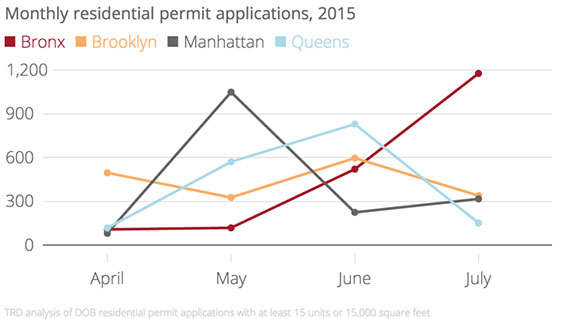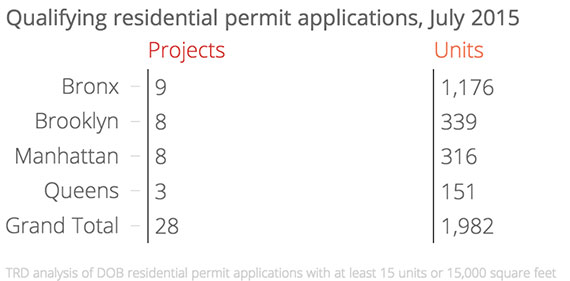Plans for a Donald Trump luxury clubhouse and two massive affordable housing buildings were filed with the Department of Buildings on the same day in July, and all three were in the Bronx. With land availability and prices far below those of neighboring Manhattan, the Bronx is becoming a zone of real estate extremes, and developers are moving in fast.
Last month, the Bronx accounted for the majority of planned residential units filed with the DOB, with 1,176 units. Since April, the Bronx has registered 1,883 units in permit applications, the most of any borough, according to a TRD analysis of permit applications with at least 15 units or 15,000 square feet.
As TRD reported in May, more than a million square feet of residential and hotel space are planned for the Bronx, a borough that for decades was left out of major development plans. These days, the Bronx is benefiting from low land prices and a city-wide push for more affordable housing. Of the 1,176 units applied for in July alone, about 40 percent are already known to be affordable housing.
Two buildings at the colossal, $345 million La Central affordable housing complex in Melrose brought 496 future residential units with over 600,000 square feet to the South Bronx. Many of the remaining 680 units submitted for the Bronx in July could also be designated as affordable housing. La Central will join two other large-scale developments with affordable components — Nelson Management’s 217-unit towers planned at the site of the rent-stabilized Lafayette-Boynton Complex, and a proposed 136-unit tower at 491 Gerard Avenue, a mixed-income project headed by Monadnock Construction.
The South Bronx market in particular is changing quickly, and noted developer Joseph Chetrit now owns five acres along the Harlem River, where he and Somerset Partners plan to embark on a market-rate residential project that could include six towers and span as much as 1.2 million square feet.
The composition of new development in the Bronx is hardly limited to projects with affordable housing components. The Trump Organization in July filed for a nearly 19,000-square-foot golf clubhouse, complete with 40-foot high vaulted ceilings, and two 100+ diner restaurants with full bars, one of which will span the 5,000-square-foot Outdoor Terrace. The estimated price tag was $10 million. The much-anticipated clubhouse is connected to the currently clubhouse-less, Jack Nicklaus-designed Ferry Point golf course in Throggs Neck.
Outside of the Bronx, there are plenty of developers ready to put shovels into the ground for market-rate projects, like Righteous of Park Slope LLC (an email address points to Brooklyn developer Pacific Management), which plans to construct a 10-unit mixed-use property at 488 4th Avenue in Brooklyn on the increasingly condo-laden stretch that separates Gowanus and Park Slope.
In Manhattan, Urban Muse filed for a nearly 300-foot-tall condo high rise with 163 units at 34 Park Row in the Financial District. Joseph Moinian (who just built the largest residential rental tower in New York by unit count) plans to construct a 163-unit building at 572 11th Avenue in Midtown West. Moinian’s plans will likely require the demolition of the historic Market Diner, the former haunt of many famous New Yorkers such as Frank Sinatra and Jerry Seinfeld.
In Queens, Jannat Hospitality Group followed the recent trend of thinking up sizable hotels in heavily industrial areas. Jannat’s filing for 175 rooms at 12-02 37th Avenue in northern Long Island City will test the potential for visitors in an area dotted by auto repair shops and scaffolding manufacturers. There’s still plenty of industrial development going on in western Queens, too — the largest filing was for a massive 174,000-square-foot storage facility from self-storage developers Madison Development at 31-07 20th Avenue in Astoria.
Other notable commercial filings across the city include plans for the Long Island College Hospital in Cobble Hill, Brooklyn, where NYU Medical Center will establish new medical facilities designed by Perkins Eastman. Fortis Property Group, which owns the site, seeks to develop the remaining space for a residential project yet to be filed.


